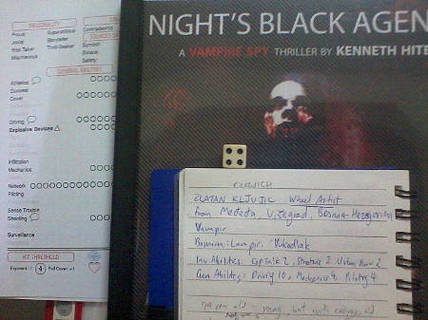
Night’s Black Agents has a couple of special Abilities that help players to emulate the tangled networks and cover stories of the spy genre.
Cover represents the carefully-constructed false identities that each agent has built up over the years across the globe. Every player starts with at least 10 points of Cover, so nobody goes into a fresh campaign without this useful feature. Cover identities are not defined ahead of time; instead, you may permanently move any number of Cover points into a cover identity during play to say that you had this identity all along. The more points you put into the cover pool of that identity, the deeper and well-established the cover is. If you have 8 or more in the Disguise ability, you can even create a connected cover identity that is a known associate of an NPC. Also, with every cover identity you define, you can link it to a familiar city so that you get easier rolls when making your way around or trying to source for black market goods in that city.
Network represents the many contacts and allies that your agent has made around the world. Every player starts with a minimum of 15 Network. Similar to Cover, you can spend Network to create new contacts any time during a game. The more points you put into a contact, the more well-connected that person is. You can call upon the contact as an information source, depending on whether or not the Director feels it is an appropriate source of clues, or for various favours, from getting access to the secret Vatican archives to calling in Carabinieri helicopters to evacuate you from a sinking ferry in the Bay of Naples.
The drawback for both cover identities and Network contacts is while you get tremendous flexibility in defining them in play, they get used up permanently whenever they are tested. When your cover is tested by going through a security check, or when your contact pulls strings to do a favour for you, you need to roll against a difficulty that is usually determined by the current level of security or scrutiny that you need to bypass. Players will find that it may not be that easy to simply burn through their cover identities and contacts when it costs Experience Points just to replenish their points. Plus, I’ve found that while some players are more than willing to use up a contact and toss them aside, others will invest even more points in a favourite NPC just to keep the Director from killing them off once their usefulness is ended!
Cover represents the carefully-constructed false identities that each agent has built up over the years across the globe. Every player starts with at least 10 points of Cover, so nobody goes into a fresh campaign without this useful feature. Cover identities are not defined ahead of time; instead, you may permanently move any number of Cover points into a cover identity during play to say that you had this identity all along. The more points you put into the cover pool of that identity, the deeper and well-established the cover is. If you have 8 or more in the Disguise ability, you can even create a connected cover identity that is a known associate of an NPC. Also, with every cover identity you define, you can link it to a familiar city so that you get easier rolls when making your way around or trying to source for black market goods in that city.
Network represents the many contacts and allies that your agent has made around the world. Every player starts with a minimum of 15 Network. Similar to Cover, you can spend Network to create new contacts any time during a game. The more points you put into a contact, the more well-connected that person is. You can call upon the contact as an information source, depending on whether or not the Director feels it is an appropriate source of clues, or for various favours, from getting access to the secret Vatican archives to calling in Carabinieri helicopters to evacuate you from a sinking ferry in the Bay of Naples.
The drawback for both cover identities and Network contacts is while you get tremendous flexibility in defining them in play, they get used up permanently whenever they are tested. When your cover is tested by going through a security check, or when your contact pulls strings to do a favour for you, you need to roll against a difficulty that is usually determined by the current level of security or scrutiny that you need to bypass. Players will find that it may not be that easy to simply burn through their cover identities and contacts when it costs Experience Points just to replenish their points. Plus, I’ve found that while some players are more than willing to use up a contact and toss them aside, others will invest even more points in a favourite NPC just to keep the Director from killing them off once their usefulness is ended!
 RSS Feed
RSS Feed